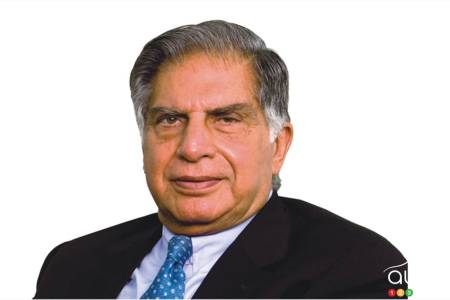Indian businessman Ratan Tata, founder of Tata Motors and purchaser of Jaguar-Land Rover, has died aged 86. He leaves a varied legacy.
When Tata took the decision to buy Jaguar Land Rover (JLR) from Ford in 2008, it was seen as a bold, even reckless move. Yet it proved to be a decisive choice for the future of the troubled British automaker.
A vision that transcends borders
Tata, who received a state funeral yesterday, October 10, transformed the Tata conglomerate into a diversified global empire. The acquisition of Jaguar Land Rover was part of this global strategy.
Faced with competition from Mahindra, another Indian giant, Tata was able to buy JLR for $2.3 billion USD, less than the 2.75 billion that Ford had paid eight years earlier. At the time, JLR was in dire straits, and Ford was no longer in a position to turn it around.
A risky bet for Tata Motors
This acquisition was particularly risky for Tata Motors, then a modest player in the Indian automotive market. The company was trying to revolutionize mobility with affordable cars, such as the Nano, priced at $2,500. That project was close to Ratan Tata's heart but which did not meet with the expected success.
In addition, there were few synergies between Tata's economy cars and JLR's premium brands, which limited economies of scale.
A difficult start for JLR
Despite financial support from Ford to ensure JLR's survival after the acquisition, the first year under Tata stewardship ended with a loss of £350 million, or just over $700 million USD.
However, Tata had already begun to structure a solid plan to turn JLR around. He appointed a management team composed mainly of former BMW executives, and they harnessed the power of the Land Rover and Range Rover brands to penetrate new markets, notably in China. By 2011, JLR was posting profits of over $2 billion.
“Staggering” ambition
Ratan Tata, true to his management style, managed from a distance, placing total trust in the executives he had chosen or inherited. However, he often expressed bewilderment at the British work ethic. The Times reported his criticism of the reluctance of employees at JLR and Corus (another Tata acquisition) to work overtime or schedule meetings after 5pm.
Ratan Tata's legacy
Despite the challenges, Tata has left a lasting legacy in the global automotive industry. His vision and ambition, though considered foolhardy at the time, enabled JLR to rise from the ashes, transforming a struggling brand into a successful global player.
Ratan Tata's acquisition of Jaguar Land Rover was more than just a business transaction. It was a bold gamble that reflected a long-term strategic vision. Despite initial uncertainties and criticism, Tata was able to lead JLR to success, proving that sometimes, calculated risk-taking can change a company's destiny.
